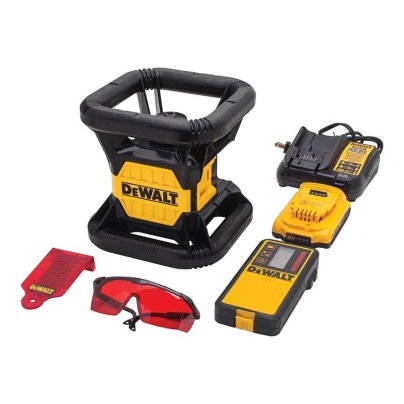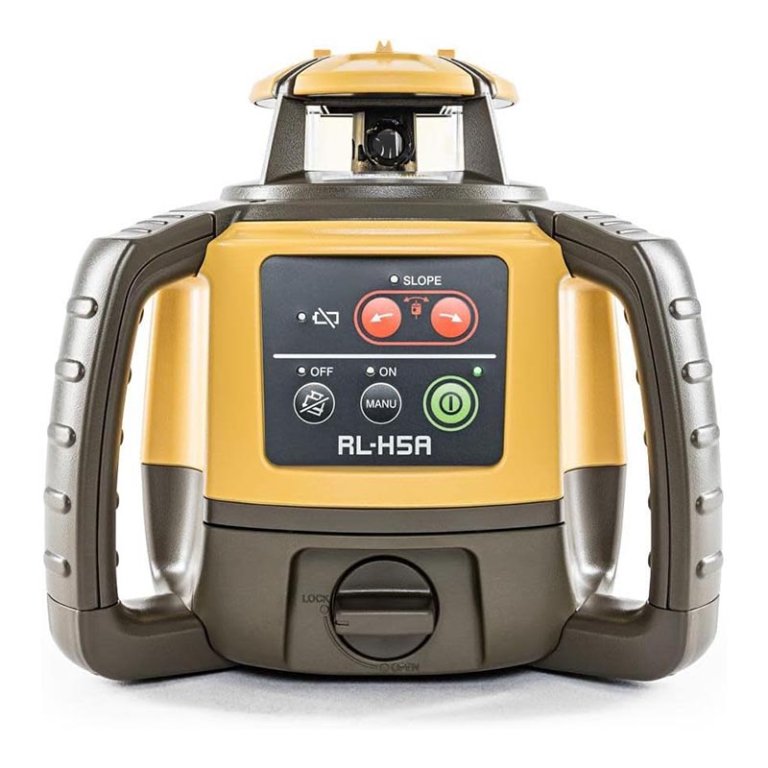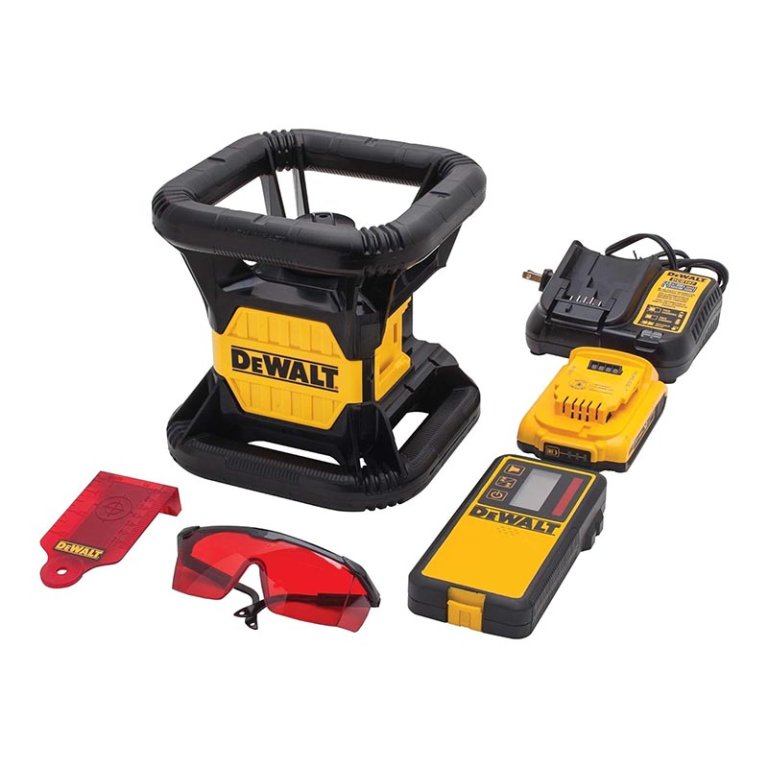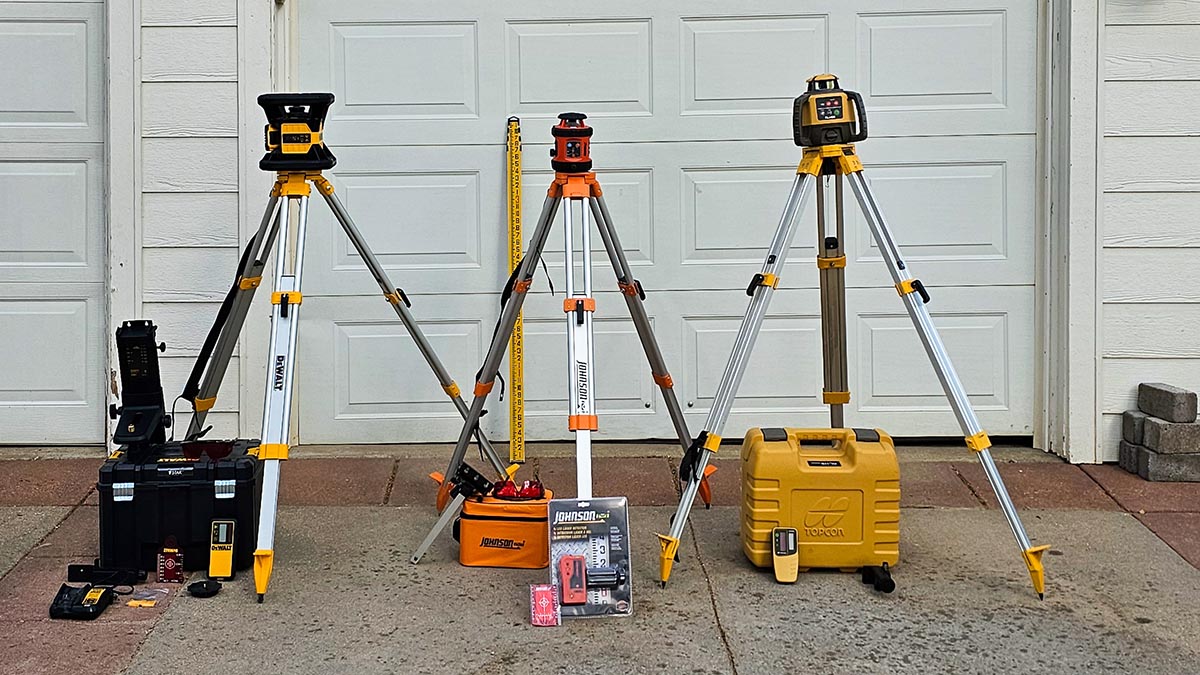
We may earn revenue from the products available on this page and participate in affiliate programs. Learn More ›
Rotary laser levels are invaluable tools on jobsites where maintaining accuracy over a wide area or a long distance is crucial. They determine slopes and grades as well as horizontal and vertical planes. We researched more than 20 models and selected three of them for hands-on field testing. Our top pick, the Topcon RL-H5A Self-Leveling Construction Laser, offers a winning combination of precision, user-friendly features, and rock-solid durability.
While invaluable, rotary laser levels can also be complex tools, and choosing the right one is sometimes challenging, especially for novice users. Ahead, learn how to determine the features you’ll most likely need and discover how the models we tested—plus a few options for pros—fared in this guide to the best rotary laser levels.
- BEST OVERALL: Topcon RL-H5A Self-Leveling Construction Laser
↓ Jump to Review - BEST BANG FOR THE BUCK: Johnson Self-Leveling Horizontal Rotary Laser System
↓ Jump to Review - BEST FOR CONSTRUCTION: DeWalt 20V MAX Red Rotary Laser
↓ Jump to Review - BEST SEMIPRO: Spectra Precision LL300N-2 Self-Leveling Laser Level
↓ Jump to Review - MOST VERSATILE: Bosch Revolve900 Horizontal/Vertical Rotary Laser Kit
↓ Jump to Review

How We Tested the Best Rotary Laser Levels
Before selecting three models to test, we researched several rotating level lasers, with a focus on accuracy, high performance, and excellent consumer ratings. We considered the manufacturer to an extent; after all, Topcon Corporation is known worldwide for producing precision measuring instruments. However, we were also looking for self-leveling laser levels that professionals could use while still being considered DIY tools.
In our field tests, we operated the rotating laser levels just as we would on projects that required determining precise horizontal or vertical planes and sloped grades. We used these tools to set level lines indoors and to shoot grade outdoors. Using the included beam detectors, we tested laser beam coverage and tried out any additional features the levels offered. We also subjected the levels to simulated weather conditions suitable to their protection ratings. Then, we awarded points to each tool based on a rubric: The better the rotary laser level performed on a test, the more points we gave it.
After testing, we averaged the scores to determine our top pick and categorize the remaining models as to their best use.
| Testing Stats | |
| Products tested: | 3 |
| Hours spent testing: | 12 |
| Tests performed: | 4 |
| Price range: | $550 to $800 |
Our Top Picks
The Topcon, Johnson, and DeWalt rotary laser levels all excelled in our hands-on tests. Keep reading to learn the pros and cons of each model and how they performed in various situations. Then, check out a few more levels we didn’t test but that still meet our high standards and include useful features essential for the best rotary laser levels.
Best Overall
Topcon RL-H5A Self-Leveling Construction Laser
What We Like
- Highly accurate to within 1/16 inch at a distance of 100 feet
- Self-leveling feature ensures the laser beam is horizontal and level
- Excellent battery life of up to 100 hours of runtime; ideal for outdoor work
What We Don’t Like
- No grade rod or tripod included; would require a separate purchase if needed
Product Specs
- Type: Rotary red beam
- Accuracy: ± 1/16 inch at 100 feet
- Maximum range: 2,600 feet (diameter)
- Protection rating: IP66
Our Ratings: Ease of Use 4.8/5; Accuracy 5/5; Performance 5/5; Durability 5/5; Value 4.8/5
The Topcon RL-H5A self-leveling laser is built for the harsh environment of a construction site, with dust and water protection rated at IP66. We tested this laser level tool indoors and outdoors, and it excelled in all our trials.
This model automatically self-levels. To begin our testing, we set up the level and turned it on. It took a few seconds for the internal mechanism to determine the true level, and then the red beam started rotating. In indoor tests, we were able to see the beam easily on the walls, but red beams are nearly invisible outdoors, so we had to rely on the detector to pick up the beam—something it did very well. The detector fits on a grade rod and emits different pitch beeps that indicate if you need to slide it up or down or are level with the beam.
The Topcon rotary laser is a high-precision tool. It is accurate to within 1/16 inch at 100 feet and has an impressive range of 2,600 feet (1,300 feet radius). This model also has a manual slope feature that allowed us to check the grade of our yard for the recommended slope. It doesn’t calculate slope: We had to do the math and adjust the receiver height on the rod to suit. Then, the Topcon RL-H5A detected the receiver to create a perfect 2 percent slope.
Unfortunately, this model does not include a tripod or grading rod, so we had to borrow from other models we tested. It runs on four D batteries, but Topcon sells a rechargeable battery pack as well. This Best Overall pick is a highly impressive laser rotating level. Its best use is for determining the perfect horizontal level, but you can also use it to shoot a sloped grade.
Read our full review: Topcon RL-H5A Self-Leveling Construction Laser
Get the Topcon rotary laser level at Amazon, The Home Depot, or Walmart.
Best Bang for the Buck
Johnson Self-Leveling Horizontal Rotary Laser System
What We Like
- Comprehensive kit includes all the necessary tools without requiring additional purchases
- Suitable for both indoor and outdoor use with an impressive range
- Includes a durable carrying case for added protection
What We Don’t Like
- Relatively short runtime of just 12 hours; may not be ideal for extended projects
Product Specs
- Type: Rotary red beam
- Accuracy: ± ⅛ inch at 50 feet
- Maximum range: 800 feet (diameter)
- Protection rating: IP54
This Bob Vila Approved product carries our brand’s highest level of recommendation.
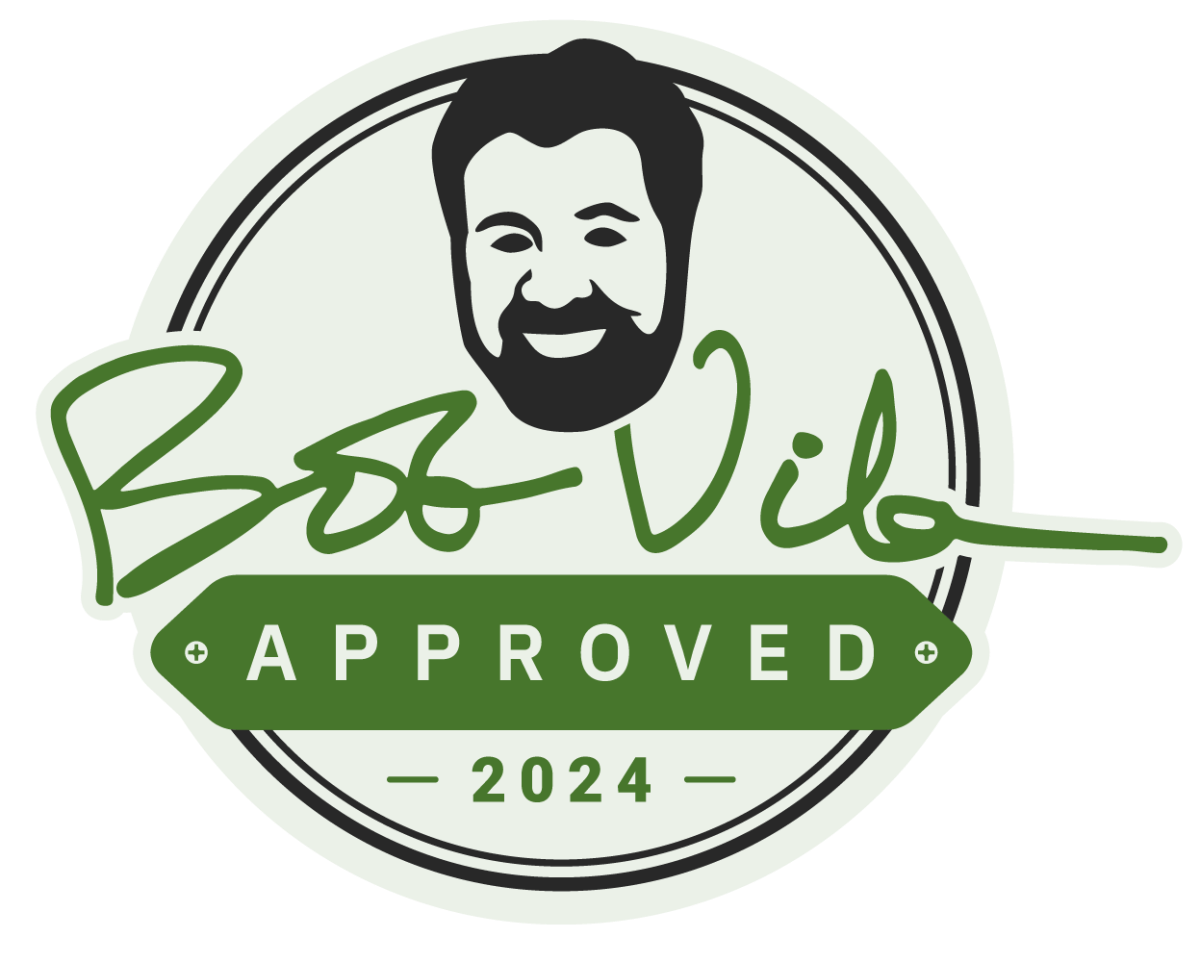
Bob Vila Approved recognizes the household and DIY products that impressed us most in our real-world testing and that exemplify core values of the Bob Vila brand, including craftsmanship, innovation, and value for the dollar. Winners of this designation come recommended by our professional review team and are personally approved by Bob Vila.
Our Ratings: Ease of Use 4.8/5; Accuracy 4.5/5; Performance 4.5/5; Durability 4.5/5; Value 4.8/5
The Johnson rotary laser level kit features everything users need to start shooting grade right out of the box, making it one of the most affordable models on the market today.
This versatile level is for both indoor and outdoor use, where it can reach 400 feet (an 800-foot diameter). It’s accurate to within ⅛ inch over 50 feet, which is more than acceptable for most construction and landscaping projects. We were able to see the red laser line indoors with ease but could not see it outdoors, even using the red glasses included in the kit. Fortunately, the detector was highly accurate and had no problem picking up the beam.
Users can set the rotation speed to 200, 400, or 600 revolutions per minute (RPM). In our testing, we discovered it was best to set the speed to the highest RPM while using the detector to detect the beam and then reduce it to save on battery life. The Johnson level runs on four AA batteries, providing a runtime of up to 12 hours. That’s a little on the short side, but you can double the runtime by using rechargeable batteries and keeping a set of spare batteries charged.
The kit includes a sturdy tripod, red-tinted glasses, a flat laser target, a 13-foot grading rod, a laser receiver, a bracket for either wall-mount or drop-ceiling installation, and a padded soft case to store all the items.
Get the Johnson rotary laser level at Amazon, Walmart, or Menards (plus hard case).
Best for Construction
DeWalt 20V MAX Red Rotary Laser
What We Like
- Offers vertical alignment in addition to horizontal level, making it helpful for building walls and other vertical structures
- Bright red laser beam is easier to see than on other models
- Includes a high-end grade rod, a battery, a charger, red glasses, and a carrying case
- Accurate to within ⅛ inch at 100 feet—suitable for precision leveling
What We Don’t Like
- LED window on detector is small and may be challenging for some users to see
Product Specs
- Type: Rotary red beam
- Accuracy: ± ⅛ inch at 100 feet
- Maximum range: 1,500 feet (diameter)
- Protection rating: IP54
Our Ratings: Ease of Use 5/5; Accuracy 4.5/5; Performance 4.5/5; Durability 5/5; Value 4.8/5
In addition to determining horizontal level, the DeWalt rotary laser line level also indicates vertical alignment (plumb), which makes it handy for builders who want to ensure perfectly straight stud walls, retaining walls, cabinets, or any other vertical need.
The DeWalt level offered the brightest red laser beam of the three models we tested. We could see it clearly indoors and dimly outdoors when wearing the red glasses included with the tool. The level also comes with a target card that makes it easier to detect the beam indoors when using a grade rod and a detector might not be suitable.
DeWalt tools frequently offer extra features, and this level is no exception. Users can adjust the laser to scan 15, 45, or 90 degrees, which is convenient when working in tight spaces that don’t require casting a long range circular beam. The beam is accurate to within ⅛ inch at 100 feet, making it an excellent choice for precision leveling for installing cabinets, setting joists, or forming foundation walls.
The only downside—and it’s not a deal-breaker—is that the detector window is a bit small, so we had some difficulty seeing the arrows and lines. The beeps, however, are strong, and that made it possible to use this model as an outdoor laser level on a sunny day. Additional accessories include a sturdy grade rod, a battery, a charger, and a heavy-duty carry case. If you’re a DeWalt tool aficionado, you already know you can swap 20V MAX batteries from other DeWalt tools to power this level.
Get the DeWalt rotary laser level at Amazon, The Home Depot, or Grainger.
Other Options for Pros
While we tested the three models we felt best represented our readers’ overall needs, there are additional high-quality rotation laser levels from which to choose. We especially like the following Spectra and Bosch models—the Spectra level for its high accuracy and resistance to the elements and the Bosch level for its ability to determine both horizontal and plumb and the included remote control.
Spectra Precision LL300N-2 Laser Level Kit
Spectra Precision is a leading brand in rotary laser levels for construction and landscaping work. The LL300N-2 model offers rapid setup thanks to a single button that self-levels. We really like that the accuracy of up to 3/32 inch at 100 feet is better than many other options, and it also features an impressive 1,650-foot range (diameter). Rotation is fixed at 600 RPM, though this is relatively common among rotary lasers for outdoor use.
The dust and water protection rating of IP66 is excellent. The manufacturer has drop tested the Spectra Precision LL300N-2 to 3 feet for free fall on concrete and 5 feet if the tripod is knocked over. We also took note of the impressive battery life, with four D batteries providing up to 90 hours of runtime. This model includes a rechargeable battery (NiMH) as an option.
Get the Spectra Precision rotary laser level at Amazon or Toolup.com.
Bosch Revolve900 Horizontal/Vertical Rotary Laser Kit
The Bosch Revolve900 level offers high performance and versatility at a competitive price. It features a range of 100 feet indoors; 1,000 feet outdoors; and an accuracy of up to ⅛ inch at 100 feet. Electronic self-leveling includes a disturbance monitor to ensure consistent results, while a remote control allows one-person setup from a distance.
We like the idea of being able to select rotation speeds of 150, 300, or 600 RPM to allow you to use a slower speed to prolong battery life. The laser has six distance settings, making it versatile indoors and outdoors.
The Bosch rotary laser level has a decent protection rating of IP54, although we’d prefer slightly more protection since this tool may be used outdoors. The valuable accessory kit includes a tripod, an 8-foot grade rod, a remote control, a target, a laser receiver, a drop-ceiling mount, red-tinted glasses, and a carrying case. The grade rod is on the short side but will likely be suitable for most construction projects, although it may not be long enough to use the tool as a grader laser level.
Get the Bosch rotary laser level at Amazon, Ace Hardware, or Northern Tool + Equipment.
Jump to Our Top Picks
What to Consider When Choosing a Rotary Laser Level
A manual level is a great way to judge horizontal or vertical accuracy over short distances. A straight or cross-line laser level is a step up, with the ability to project a line against a surface. A rotary laser level tops them both by being able to emit a level beam in a circle.
The tool’s laser level spinning apparatus projects a rotating 360-degree beam and is suited for indoor and outdoor use. Rotary laser levels typically have greater range and higher accuracy than other level types. Keep reading to learn more about key specifications and features to consider when choosing a rotary laser level.
Accuracy and Range
The accuracy of any measuring or leveling laser is given as a fraction of an inch over a fixed distance. It’s important to look at both figures. A rotary laser tool with an accuracy of ⅛ inch over 100 feet is considerably more accurate than one that quotes ⅛ inch over a 50-foot span, for instance. However, the latter may well meet the expectations of the job, and it will likely cost less. Some manufacturers provide mixed laser measurements, like 3/32 inch over 30 meters, so a little math may be required to make direct comparisons.
The best rotary laser levels have a tremendous range. The lowest beam distance we found was 600 feet, and the most powerful are capable of sending a beam 2,600 feet, just short of half a mile. However, an impressive range means little without accuracy. For example, an inexpensive rotary laser level rated at ¼ inch over 50 feet will be accurate to plus or minus 10 feet at 2,000 feet, whereas a top model will only be about 2½ inches off.
Beam Quality and Adjustments
The visibility of the laser is a key factor. Some of the best laser levels emit green laser beams, which are easier to see than red lasers. However, green lasers are considerably more expensive, so most rotary laser levels produce a red beam.
Rotary laser levels can be indoor models, outdoor models, or both. Over distance, the red beam becomes difficult to see. Using glasses with red lenses (which often are included) helps visibility considerably. For long distances, beam receivers or detectors are often mounted on a tripod and emit a beep to indicate when they are level with the projected beam.
Another important aspect is the laser’s rotational speed. As the laser rotates, it only rests on one spot for a moment. This is not generally a problem for tasks like leveling outdoors, grading, and siting posts, but it can complicate indoor tasks like tiling or fitting wainscot or trim because the beam doesn’t project a solid line. However, if it’s possible to increase the speed, the beam is in contact with the surface longer and gives the appearance of a solid line. Many rotary level lasers offer this function, making them a more versatile tool.
Self-Leveling
If the rotary laser isn’t level to start with, then clearly any measurements taken from it will be faulty. Low-cost rotary laser levels sometimes need manual setup using a bubble as found in a standard level. Having only a visual guide doesn’t necessarily reduce accuracy over short distances, but any error is magnified as distances increase.
Self-leveling models have either a self-leveling feature that users can turn on and off or one that engages automatically. The former is helpful on those occasions requiring a sloped beam. Accuracy is again important, and most will self-level within 4 or 5 degrees. One big advantage of self-leveling rotary laser levels is that they will correct themselves if accidentally bumped. Other types require frequent checking to ensure an error won’t go unnoticed.
Durability and Battery Life
Rotary laser levels are often used in harsh environments. They can face temperature extremes, inclement weather, dust, and dirt. Plus, it’s not uncommon for users to drop them or knock them over.
Manufacturers of pricier models usually provide a tough outer casing that is subject to drop testing. The best rotary laser levels also have an IP rating. This is an independent testing standard that displays two numbers to indicate protection from both water and dust. IP66, for example, states that the device is completely dustproof and can withstand strong jets of water. It is also worth checking the operating temperature range.
As rotary laser levels invariably work on battery power, the type of battery and its life are a consideration, though carrying a spare set is not usually difficult. Surprisingly few models use rechargeable batteries as standard, though it might be possible to add them as an alternative.
Accessories
Several accessories can play into the decision to purchase a rotary laser level. Here are a few examples:
- Having a tripod to mount the rotary laser level is something of a necessity, though one is not always included.
- Wearing glasses with red lenses can render red lasers more visible.
- Laser receivers make it easier to identify the location of the beam, especially over long distances (a second tripod is desirable).
- A grade rod—also called a leveling rod or grading rod—is a tall, slender rod with a range of markings used for surveying and landscaping. The laser beam is projected toward it. It is often possible to clamp a laser receiver to the grade rod to improve accuracy.
- One or more clamps may be provided to fix the rotary laser to beams, scaffolding, and other fixtures.
- A remote control allows the user to adjust the level from a distance, which is handy when there is only one worker.
- A carrying case is a helpful extra.
FAQs
We’ve covered a great deal of valuable information aimed at helping you find the best rotary laser level for your needs or as a gift for dad, so this guide should have answered many questions. However, during our research, we came across several queries that cropped up quite frequently, so we have gathered those below, along with relevant answers.
Accuracy varies among models. The least amount of accuracy may be ± ¼ inch over 50 feet. The best rotary laser levels are ± ⅛ inch over 100 feet.
Most people find green lasers easier to see, particularly outdoors. However, special red-tinted glasses largely compensate for the difference, and manufacturers often include these glasses with red rotary laser levels.
Tripods certainly help maintain accuracy. Trying to find somewhere stable to place a rotary laser level can be difficult, so a tripod provides a solid platform regardless of the instability of any given surface.
No. Some rotary laser levels offer no waterproofing capabilities, and others might be described as splashproof or showerproof. To ensure a rotary laser level is waterproof, it should have an IP rating, such as IP67, for example. The first number indicates the level of dust protection, and the second number indicates the level of water protection.
Although it can vary from one manufacturer to the next, red rotary laser levels are less expensive and typically use less energy, so the batteries last longer. Because of the extra cost, green rotary laser levels are not common.
Meet the Tester
Glenda Taylor is a product tester and writer specializing in the construction, remodeling, and real estate industries. She and her husband own a general contracting company, and Taylor is experienced in both residential and commercial building applications. She tests a wide range of power tools as well as other home improvement, household, and lawn-and-garden products.
Additional research provided by Bob Beacham.


